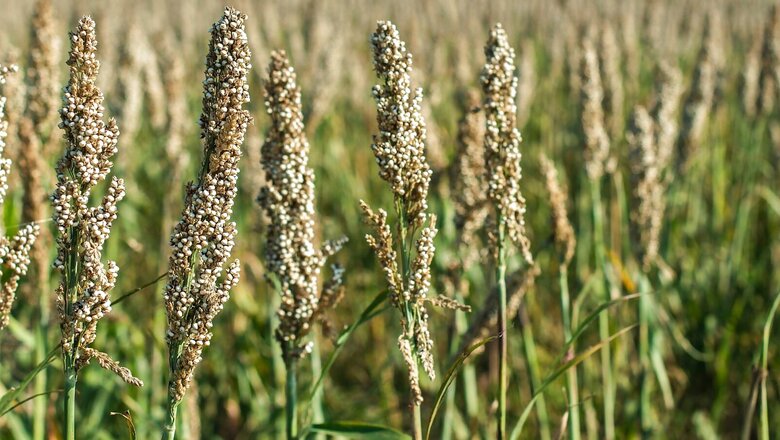
views
With the United Nations announcing 2023 as the ‘International Year of Millets’, and India being the largest producer of the cereal, the government has drawn up an action plan to promote the superfood to the world. The initiative is aimed at increasing export of this healthy alternative to rice and wheat.
The Commerce and Industry Ministry has prepared a strategy to promote Indian millets exports across the globe, starting next month. Dr Dayakar Rao Benhur, principal scientist at ICAR-Indian Institute of Millet Research, said: “Millets have the potential to make it big as they are gluten free and are nutritional power houses. Over the last 12 years, our institute has developed a value chain to make millets more consumer friendly. We have nurtured around 300 start-ups, and, with this initiative from the Indian government, we are now ready to showcase our products to the world.”
While chalking out the strategy of the programme, three categories of countries have been kept in mind — those growing millets, those which are growing and exporting, and those which are not growing the cereal.
The UN General Assembly declared 2023 as the international year of millets. This was supported by 72 countries, most of which are African and South East Asian nations
“Around 20 departments from the central government are involved in this. Under the Ministry of agriculture, a programme is being conducted in which 150 countries will participate. Our Prime Minister has been pushing for Indian traditional foods for a long time. Sometimes, millets are being promoted in conjunction with yoga, which is already popular. Millets can be a hit in importing countries, which have a larger Indian diaspora,” added the scientist.
Talking about the value additions done to the cereal during research, Dr Dayakar said: “Since millets do not have gluten, it does not have a sticky nature that is important in a cereal. We worked on the starch components of the cereal so that it turns glutinous at a certain temperature. We have also built a database of recipes in collaboration with Indian Federation of Culinary Associations.”
“I am hopeful about the demand traction with this initiative, but we must remember that changing food habits is a behavioural change that takes time. Millets can come as a blessing at a time lifestyle diseases have taken over our lives,” he added.
Vishala Reddy, who founded Millet Bank to promote the cereal and help farmers in arid regions, told News18: “We are one of the main drivers in this campaign by the government of India. We are doing lunches and sensitisation programmes during which ambassadors from other countries have been invited. Start-ups have been given platforms to promote their products. Policy changes are being brought and the campaigns are extensive. The government is sending letters to schools and colleges to promote millet meals, and conducting extensive campaigns.”
“Millets are a forgotten crop. It’s a nutritional powerhouse that can grow in dryland agricultural system. Around 40% of agricultural land in India are drylands. So promotion of millets is necessary to bring food security,” she added.
Sujatha Stephen RD, chief nutritionist at Yashoda Hospitals in Hyderabad, lists out the health benefits of millets:
Millets contain a host of micronutrients such as iron, calcium, and phosphorus. Also, they take time to digest, which doesn’t cause the blood sugar spike associated with easily digestible food. So introducing millets into your diet can help control diabetes for the same reason.
Millet production is good for the environment. It is because they are primarily rain-fed crops, which do not attract pests and can grow perfectly well without pesticides.
Millets have gained popularity in the West because they are gluten-free and boasts high protein, fiber, and antioxidant contents. They are also called the superfood because of the numerous health benefits they offer such as aiding weight loss, lowering blood sugar levels, preventing cardiovascular diseases along with enhancing immunity.
There are different types of millets such as Foxtail (Korralu in Telugu), Browntop (Andu korralu), Little Millets (Samalu), Kodo (Arikalu) and Barnyard (Oodalu).
Read all the Latest India News here



















Comments
0 comment